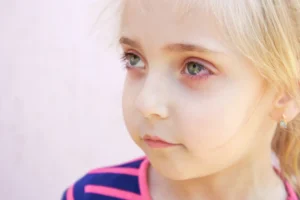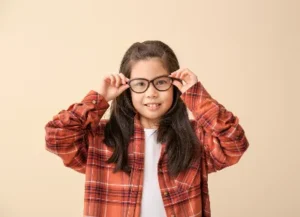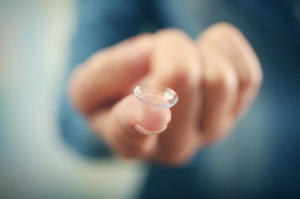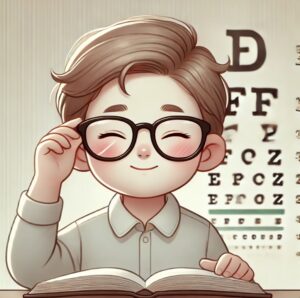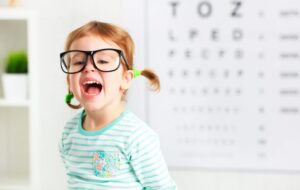8-year-old Tom was recently diagnosed with myopia. The doctor recommended a special type of glasses called “defocus glasses,” saying they could help slow down the worsening of his nearsightedness. Tom’s parents were confused—what are these glasses exactly? Can they really cure myopia? Do they have any side effects?
Today, let’s talk about defocus glasses and see if they really work and whether they are suitable for children.
What Are Defocus Glasses? How Are They Different from Regular Glasses?
Defocus glasses, also known as “myopia control glasses,” are specially designed to slow down the progression of nearsightedness.
Regular glasses help children see clearly, but defocus glasses not only improve vision but also help control how fast myopia worsens. Here’s how they work:
- They ensure that the central vision is clear, just like regular glasses.
- However, they create a slight blur in the peripheral vision (a process called "myopic defocus").
- This sends a signal to the brain, reducing the eye’s tendency to elongate, which slows down the progression of myopia.
In simple terms, regular glasses only correct vision, while defocus glasses both correct vision and help slow down myopia progression.
Can Defocus Glasses Cure Myopia?
No! There is currently no cure for myopia.
Myopia happens when the eyeball becomes elongated, just like growing taller—it is irreversible. The purpose of defocus glasses is to slow down the progression of myopia, not to eliminate it.
Studies have shown that children who wear defocus glasses experience a 30%-60% slower progression of myopia compared to those wearing regular glasses. For example:
- A child wearing regular glasses might see their myopia increase by 100 degrees per year.
- A child wearing defocus glasses might only see an increase of 40-70 degrees per year.
Although myopia won’t disappear, proper control can help reduce the risk of severe myopia in adulthood!
Are Defocus Glasses Better Than Regular Glasses? Should You Get Them for Your Child?
Each type of glasses has its pros and cons. Let’s compare them:
| Type of Glasses | Main Purpose | Suitable For | Things to Consider |
|---|---|---|---|
| Regular Glasses | Correct vision | Any child with myopia | Cannot slow down myopia progression, may lead to faster worsening |
| Defocus Glasses | Correct vision + slow myopia progression | Children aged 6-16 with mild to moderate myopia | Must be worn consistently, more expensive than regular glasses |
| Ortho-K Lenses (OK Lenses) | Worn at night to reshape the cornea, allowing clear vision during the day | Children over 8 who can follow strict hygiene rules | Requires daily care, risk of eye infection if not maintained properly |
| Outdoor Activities | Helps prevent and control myopia | Any child | Needs at least 2 hours daily for effectiveness |
Clearly, defocus glasses are one of the more effective options for controlling myopia, especially for children whose nearsightedness is progressing quickly. However, a combination of multiple methods (such as increasing outdoor activity and reducing screen time) is the best approach.
Which Children Benefit Most from Defocus Glasses?
Defocus glasses work best for children who:
✅ Are between 6-16 years old, especially those with myopia between 50 and 500 degrees (very high myopia may not respond well).
✅ Have fast-progressing myopia (e.g., an increase of 75 degrees or more per year).
✅ Do not want to wear Ortho-K lenses but still need myopia control.
✅ Can wear glasses consistently and attend regular eye check-ups.
However, some children may not be suitable for defocus glasses:
❌ Children with high astigmatism (above 150 degrees), as it may affect correction effectiveness.
❌ Children with strabismus (crossed eyes) or amblyopia (lazy eye) who require specialized treatment.
❌ Children who frequently remove their glasses or refuse to wear them properly.
What Should Parents Keep in Mind When Using Defocus Glasses?
If you decide to get defocus glasses for your child, keep these points in mind:
- Wear them consistently: Defocus glasses must be worn every day for a sufficient period to be effective. Skipping days will reduce their benefits.
- Regular eye check-ups: Visit an eye doctor every 3-6 months to monitor myopia progression and adjust the prescription if needed.
- Take care of the lenses: Defocus glasses have a special coating, so do not clean them with tissues. Use a microfiber cloth instead.
- Encourage outdoor time: Studies show that at least 2 hours of outdoor activity daily can help prevent and control myopia, even for children wearing defocus glasses.
Should You Get Defocus Glasses for Your Child?
Defocus glasses are a proven way to help slow down myopia progression, making them a good option for children with fast-worsening nearsightedness.
However, parents should understand that these glasses are not a “miracle cure”. Even with defocus glasses, myopia may still progress—just at a slower rate.
If your child is suitable and your budget allows, defocus glasses can be a worthwhile investment. But the most important thing is to maintain good eye habits, such as limiting screen time, practicing good reading posture, and spending more time outdoors.
The best way to manage myopia is not just one method, but a combination of strategies!




